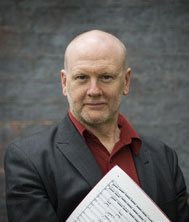 Composer-conductor Brett Dean.
Composer-conductor Brett Dean. The best music of the evening came as a surprise, and with a touch of irony. After the TSO had played their way through a couple of orchestral pieces, a young man calling himself “Scratch Bastid” took to the stage with a table full of electronic gear, and proceeded to perform his Festival Remix.
The irony, as I see it, was that Festival Remix was spontaneous, ephemeral art that can’t and won’t ever be reproduced. By contrast, the two works that preceded it were set on paper by composers with calculated intentions. Each work, in its own way, aspired to lofty artistic goals – yet each, in its own way, missed its mark.
TSO music director Peter Oundjian was on the podium for Water, by Jonny Greenwood, of Radiohead fame. Renowned as a brilliant rock guitarist, he’s also a “classical” composer – and Water, composed in 2014, certainly displays his classical bona fides.
The piece began promisingly, all sweetness and delicacy. This was fluid, shimmering music – post-minimalism meets post-impressionism, you might say – scored for strings, two flutes, two tanpuras (!), piano, chamber organ and sampler.
If Greenwood had quit while he was ahead, about five minutes into the piece, I would call it a lovely orchestral miniature. But the composer pressed onward, and the composition grew more dissonant and complicated – spoiling its initial effect for no good purpose. Too bad.
The big piece on the program was Knocking at the Hellgate by the Australian Brett Dean. Dean, who served as guest curator for this year’s New Creations Festival, was on the podium to conduct the piece, which is excerpted from his opera Bliss (premiered in Sydney in 2010).
In its concert form, Hellgate is a suite of arias and interludes for a full-sized orchestra with baritone. Joining the TSO on stage to sing the arias of Harry Joy – an anti-hero who dies, goes to Hell and comes back a better man – was baritone Russell Braun.
As a composer, Dean clearly is a skilled technician, with penchant for intricacy and detail. (In this way, the opera reminded me of another: Written on Skin by George Benjamin.) To be sure, Dean’s Hellgate did not lack for imagination. There were some jazzy bits from an electric guitar, some comical bits when a large game-show wheel was spun with a clickety-click, some prerecorded voices from (fictional) television advertisements booming over the orchestra – and at one point, players swung hollow plastic tubes to create an ethereal “wind-tunnel” effect. Yet for all its bells and whistles, Hellgate tended to get lost inside its own busy textures and broad swathes of tonally amorphous sound. What was missing was dramatic impact.
Braun brings his “A game” to everything he does – and I got the impression that he was doing all he could with the notes he was given. (He even sang falsetto, at one point.) But in the end, Dean’s notes were just so many notes.
© Colin Eatock 2016
 RSS Feed
RSS Feed

